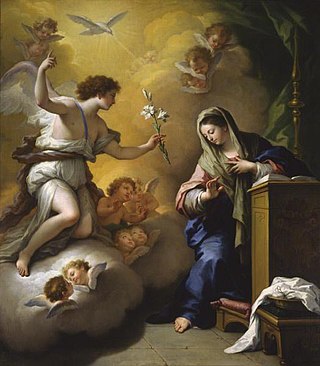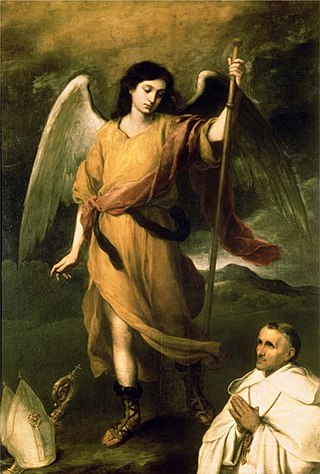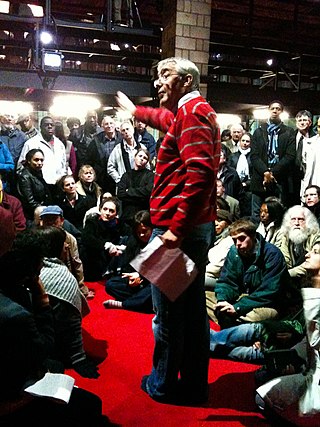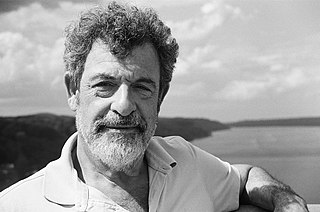
Archangels are the second-lowest rank of angel in the Christian hierarchy of angels, put forward by Pseudo-Dionysius the Areopagite in the 5th or 6th century in his book De Coelesti Hierarchia. The word "archangel" itself is usually associated with the Abrahamic religions, but beings that are very similar to archangels are found in a number of other religious traditions.

The Book of Tobit, also known as the Book of Tobias, is a 3rd or early 2nd century BC work describing how God tests the faithful, responds to prayers, and protects the covenant community. It tells the story of two Israelite families, that of the blind Tobit in Nineveh and of the abandoned Sarah in Ecbatana. Tobit's son Tobias is sent to retrieve ten silver talents that Tobit once left in Rages, a town in Media; guided and aided by the angel Raphael he arrives in Ecbatana, where he meets Sarah. A demon named Asmodeus has fallen in love with her and kills anyone she intends to marry, but with the aid of Raphael the demon is exorcised and Tobias and Sarah marry, after which they return to Nineveh, where Tobit is cured of his blindness.

Raphael is an archangel first mentioned in the Book of Tobit and in 1 Enoch, both estimated to date from between the 3rd and 2nd century BCE. In later Jewish tradition, he became identified as one of the three heavenly visitors entertained by Abraham at the Oak of Mamre. He is not named in either the New Testament or the Quran, but later Christian tradition identified him with healing and as the angel who stirred waters in the Pool of Bethesda in John 5:2–4, and in Islam, where his name is Israfil, he is understood to be the unnamed angel of Quran 6:73, standing eternally with a trumpet to his lips, ready to announce the Day of Judgment. In Gnostic tradition, Raphael is represented on the Ophite Diagram.
This is a summary of 1999 in music in the United Kingdom.

Birmingham Opera Company is a professional opera company based in Birmingham, England, that specialises in innovative and avant-garde productions of the operatic repertoire, often in unusual venues.

Tobias Picker is an American composer, pianist, and conductor, noted for his orchestral works Old and Lost Rivers, Keys To The City, and The Encantadas, as well as his operas Emmeline, Fantastic Mr. Fox, An American Tragedy and Lili Elbe, among many other works.

Noye's Fludde is a one-act opera by the British composer Benjamin Britten, intended primarily for amateur performers, particularly children. First performed on 18 June 1958 at that year's Aldeburgh Festival, it is based on the 15th-century Chester "mystery" or "miracle" play which recounts the Old Testament story of Noah's Ark. Britten specified that the opera should be staged in churches or large halls, not in a theatre.
Jonathan Dove is an English composer of opera, choral works, plays, films, and orchestral and chamber music. He has arranged a number of operas for English Touring Opera and the City of Birmingham Touring Opera, including in 1990 an 18-player two-evening adaptation of Wagner's Der Ring des Nibelungen for CBTO. He was Artistic Director of the Spitalfields Festival from 2001 to 2006.

Richard Sidney Hickox was an English conductor of choral, orchestral and operatic music.

Flight is an English-language opera in three acts, with music by Jonathan Dove and libretto by April De Angelis. Commissioned by Glyndebourne Opera, Glyndebourne Touring Opera premiered the work at Glyndebourne Opera House in a production by Richard Jones on 24 September 1998. It received its Glyndebourne Festival premiere with the original cast at Glyndebourne Festival Opera on 14 August 1999, and was revived at Glyndebourne in August 2005.

Saul og David is the first of the two operas by the Danish composer Carl Nielsen. The four-act libretto, by Einar Christiansen, tells the Biblical story of Saul's jealousy of the young David, taken from the Book of Samuel. The first performance was at the Royal Danish Theatre, Copenhagen, on 28 November 1902.
John Wilson is a British conductor, arranger and musicologist, who conducts orchestras and operas, as well as big band jazz. He is the artistic director of Sinfonia of London.

David et Jonathas, H. 490, is an opera in five acts and a prologue by the French composer Marc-Antoine Charpentier, first performed at the Collège Louis-le-Grand, Paris, on 28 February 1688. The libretto, by Father François Bretonneau, is based on the Old Testament story of the friendship between David and Jonathan.
Tobias and the Angel is a theme in art taken from the Book of Tobit. It may refer to a number of works of art and music, including:
Mansfield Park is a 2011 chamber opera in two acts by Jonathan Dove with a libretto by Alasdair Middleton based on the 1814 novel by Jane Austen. Initially composed for four handed piano, it has been set to music for 13 piece orchestral ensemble. It tells the story of poor relation Fanny Price, sent at age 10 to live with her uncle, Sir Thomas Bertram, at his family estate, Mansfield Park.
Paul McGrath is a British conductor and television personality best known for his involvement with prominent contemporary composers such as Jonathan Dove, Julian Grant, Michael Nyman and Judith Weir and for his role as a mentor in the BBC series A Maestro at the Opera. He is the Director of Music at the University of Warwick.

Christ Church Highbury is an Anglican church in Islington, north London, next to Highbury Fields.

Il ritorno di Tobia is an oratorio in two parts composed in 1775 by Joseph Haydn. The work is the first oratorio the composer wrote and, according to Jones, was "his most extended and ambitious composition up to that time".

On the Road with the Archangel is the thirteenth novel by the American author and theologian, Frederick Buechner. The novel was first published in 1997 by Harper, San Francisco.

Tobias' Journey is an oil-on-panel painting by Flemish artist Joos de Momper. The painting showcases Momper's large scale, imaginary landscape painting and his interpretation of perspective in distant views while at the same time treating a biblical subject. The painting depicts the story of Tobit, a righteous Israelite of the tribe of Naphtali, living in Nineveh, who is sent to recover is father's money to Media, escorted by the Archangel Raphael. The painting is currently housed at the Rockox House in Antwerp.















